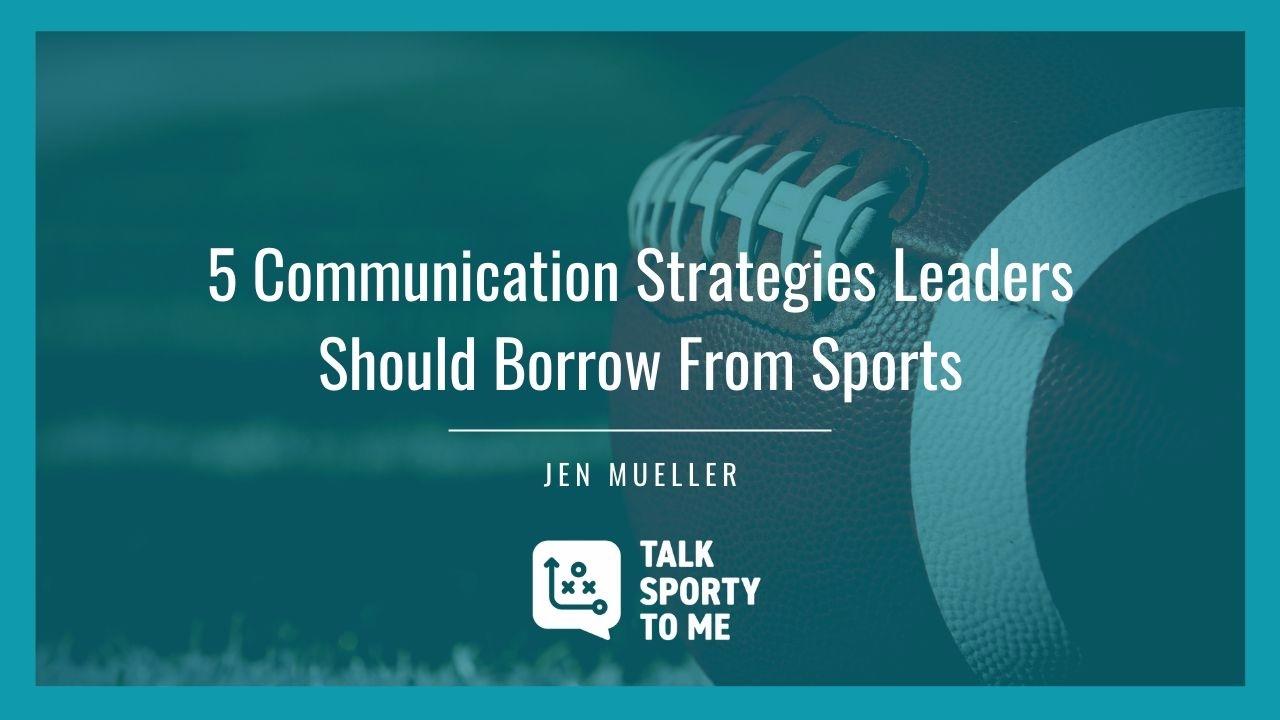5 Communication Strategies Leaders Should Borrow From Sports
Nov 15, 2019
Stats, scores and outcomes.
That’s usually how sports conversations are approached. Throw in an occasional cliché or metaphor and people really think they’re “talking sporty” when, in fact, they’re looking at sports through a very narrow lens.
Sports provides the framework leaders can use to develop effective communication skills. I see this first-hand as a sports broadcaster with nearly 20 years of experience inside professional locker rooms. You see it too because these communication takeaways are evident every time you watch a game – if you’re watching with a critical eye and an intent around developing stronger communication and leadership skills.
5 Communication Strategies Leaders Should Borrow From Sports
Have face-to-face conversations. The field of play is one of the only places face-to-face, real-time interactions are required. Coaches don’t send emails with an in-bounds play. Quarterbacks don’t text their receivers the route they’re supposed to run. A caddy doesn’t send an Instagram message to the golfer saying which club to use.
Put into practice: Athletes have to be direct, concise and present when they communicate. The same level of attentiveness and clarity should part of your daily interactions. Conversations don’t have to be long to be effective, but you do need to be clear in your messaging and aware of the big picture.
Use sports conversations as a personal branding tool. The way you talk about a game says a lot about you and reveals your personal brand. If you think you’re only a sore loser when the ref screws over your favorite team. Think again. The way you consistently react as a fan is a reflection of how you respond to similar situations at work. If you’re a sore loser who blames officials as a sports fan, there’s a good chance you’re a sore loser at work who blames other people for disappointing outcomes.
Put into practice: Be strategic and intentional in the way you talk about a game. Leaders know it’s the conversations you don’t think are important that lay the foundation for bigger conversations and opportunities.
Be willing to talk about yourself. We expect, and even encourage, athletes to talk about themselves and their accomplishments. Post-game interviews are designed for that very purpose. Identifying their contribution to a team win is natural. Taking credit for their success is expected because the stats back it up. You might not have statistics that measure your success, but you still need to know how you contributed to the team and be willing to share that with others.
Put it into practice: Being a “team player” does not mean you never take credit. It doesn’t mean you give ALL the credit to your teammates, managers or colleagues. Doing that ensure you will always be overlooked. If you can’t highlight your brilliance or understand the value you bring no one else is going to fully understand it either.
*HINT* Success Statements are a great tool in communicating personal wins and accomplishments. I’ve written about this many times including this article from the Seattle Times.
Apply “Best Intent Approach.” Competitors don’t go into a game expecting to lose or to make a mistake. They focus on their strengths and look for ways they can win. That’s what I would call “best intent approach.” It means you assume the best before you prepare for, and respond to, the worst-case scenario. In other words, they don’t psyche themselves out before their big moment.
Put it into practice: Being prepared with a backup plan is one thing. Walking into a room and expecting to be met with resistance or expecting a conversation to be contentious changes the course of the interaction before it even takes place. Make sure you have the right mindset going into your business conversations.
Stay coachable. Athletes never think they’ve “arrived” because they know their current skillset isn’t enough to keep them competing at a high level. Athletes make adjustments. They get coached and they adapt. It’s the same skillset every leader needs.
Put it into practice: Look for opportunities to be coached. Ask for specific feedback. Learn from others. There’s always something you can learn and do better.
Sports will always be viewed by sports fans as entertainment, something fun or something to pass the time. Now you’ll be able to look at sports as a way to improve your communication and leadership skills.





